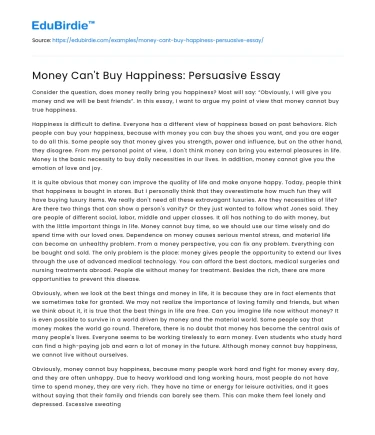Introduction
In contemporary society, the pursuit of happiness often seems inextricably linked to the accumulation of wealth. Advertisements and social media platforms inundate us with images of affluent lifestyles, insinuating that financial success is a gateway to personal fulfillment. This pervasive narrative suggests that happiness is a commodity that can be purchased, leading individuals to equate material wealth with emotional well-being. However, a growing body of research and philosophical discourse challenges this notion, positing that while money can improve living conditions, it does not necessarily equate to genuine happiness. This essay explores the complex relationship between money and happiness, examining the limitations of wealth in creating a fulfilling life. Through an analysis of psychological studies, real-world examples, and theoretical perspectives, it becomes evident that true happiness is rooted in non-materialistic values.
The Psychological Perspective: Well-Being and Wealth
Psychological research provides compelling evidence that while money can contribute to happiness, its impact is often limited by diminishing returns. A landmark study by Kahneman and Deaton (2010) revealed that beyond an annual income threshold of approximately $75,000, additional earnings have a negligible effect on an individual's day-to-day emotional well-being. This phenomenon, known as the "satiation point," suggests that once basic needs are met, further financial gain does not significantly enhance happiness. Instead, factors such as meaningful relationships, a sense of purpose, and personal achievements play a more critical role in determining life satisfaction.
Save your time!
We can take care of your essay
- Proper editing and formatting
- Free revision, title page, and bibliography
- Flexible prices and money-back guarantee
Moreover, the concept of "hedonic adaptation" explains why increased income does not necessarily lead to lasting happiness. As individuals acquire more wealth, their expectations and desires increase accordingly, leading to a cycle of perpetual dissatisfaction. For instance, a person may initially experience a surge of happiness after purchasing a new luxury car; however, this feeling quickly dissipates as they adapt to their new possession, leaving them yearning for the next material acquisition. This cycle underscores the transient nature of happiness derived from material possessions, emphasizing the need for deeper, more sustainable sources of fulfillment.
Transitioning from the psychological realm to real-world applications, it becomes apparent that wealth alone cannot guarantee happiness. Consider the case of wealthy individuals who, despite their financial success, report high levels of stress and dissatisfaction. This paradox highlights the importance of intrinsic values, such as personal growth and community involvement, in fostering authentic happiness. As such, the pursuit of wealth should be balanced with the cultivation of meaningful experiences and relationships that contribute to long-term well-being.
Real-World Examples and Theoretical Insights
Examining real-world scenarios further illustrates the limitations of money in achieving happiness. A prominent example is the life of John D. Rockefeller, one of the wealthiest individuals in history. Despite his immense fortune, Rockefeller famously remarked, "I have made many millions, but they have brought me no happiness." His sentiment reflects the broader reality that financial success does not inherently lead to personal fulfillment. In contrast, individuals who prioritize non-materialistic values often report higher levels of happiness and life satisfaction.
Theoretical insights from positive psychology also support this view, emphasizing the significance of "eudaimonic well-being," which focuses on living in accordance with one's values and realizing personal potential. According to Ryff's model of psychological well-being, factors such as autonomy, environmental mastery, and positive relationships are critical components of a fulfilling life. These elements cannot be purchased with wealth but are cultivated through intentional actions and meaningful engagement with the world.
Furthermore, cultural and social contexts play a crucial role in shaping perceptions of happiness and wealth. In collectivist societies, where communal values and social harmony are prioritized, happiness is often derived from interpersonal connections and community involvement rather than individual financial success. This contrast highlights the importance of considering cultural factors when evaluating the relationship between money and happiness, as the pursuit of wealth may not align with societal values in all contexts.
The transition from theoretical insights to addressing counter-arguments reveals a nuanced understanding of the money-happiness relationship. While critics may argue that financial security is essential for happiness, especially in alleviating stress and providing opportunities, it is crucial to recognize that beyond a certain point, the marginal utility of money diminishes. Thus, the emphasis should be on achieving a balance between financial stability and the pursuit of intrinsic values that contribute to overall well-being.
Conclusion
In conclusion, the assertion that money cannot buy happiness is supported by a wealth of psychological research, real-world examples, and theoretical perspectives. While financial resources can improve living conditions and provide opportunities, their ability to foster genuine happiness is limited. The pursuit of material wealth often leads to a cycle of hedonic adaptation and dissatisfaction, highlighting the need for deeper, more sustainable sources of fulfillment. By prioritizing intrinsic values such as meaningful relationships, personal growth, and community involvement, individuals can achieve a more balanced and satisfying life. Ultimately, happiness is a complex and multifaceted construct that transcends financial considerations, requiring a holistic approach that embraces both material and non-materialistic aspects of human existence.






 Stuck on your essay?
Stuck on your essay?

